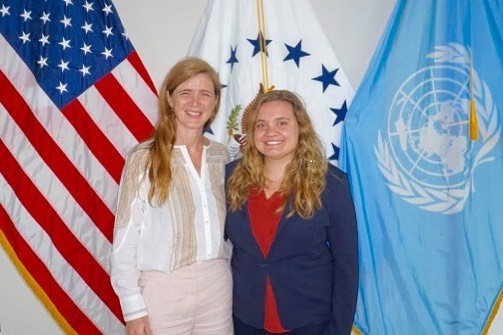
by Catherine Ruby | Sep 21, 2016 | Internship Experiences, Undergraduate Students
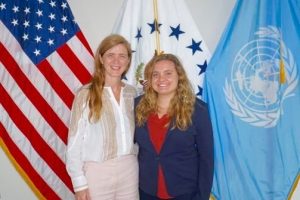
I interned for the U.S. State Department, Press and Public Diplomacy Office, at the U.S. Mission to the UN. This experience was a great one that not only taught me about work at the Department of State and the UN but also gave me my first insight into communications work, something I now consider a post-grad option that I never considered before.
Press interns at the US Mission have two main responsibilities including news monitoring and transcriptions. The Press Office is responsible for putting out verbatim transcriptions of U.S. ambassadors’ remarks at the UN and in other venues where they are operating in an official capacity. These remarks are released to the public and are government records, hence there is a high expectation of accuracy. Many reporters will ask the Press Office for transcripts of ambassadors’ remarks to include quotes in their articles. These reporters are often on deadline which increases the need for these transcripts to be done as quickly as possible. While our supervisors always checked our work before any transcripts were released, this task taught me a lot about how to work quickly under pressure while still maintaining a standard of excellence.
I also attended “brown bag lunches” that the Human Resources Department set up for the interns. We were able to have an hour long discussion with executives from different sections within the mission. This was an opportunity to learn from people doing work in all of the areas the U.S. Mission operates. We heard from many Foreign Service officers in the political and economic sections and what their responsibilities were in those areas. It was interesting to see how their work differed from the work of the Public Diplomacy officers that we worked with in press. My favorite part of these lunches was speaking with the economic officers as I am majoring in Economics as well as Diplomacy. One statement that stuck with me months later was from a discussion with an experienced economics officer who saw what she did as a form of ‘journalism’ for the government. These officers’ duties involve gathering information on the ground in whichever country they are stationed in and writing cables or “articles” that are then sent back to Washington. As someone who has always loved to write and even considered journalism as a career path, this was an eye opening conversation that showed me how I could combine all of my passions; economics, diplomacy, and writing; in a job with the U.S. State Department or another area of the federal government.
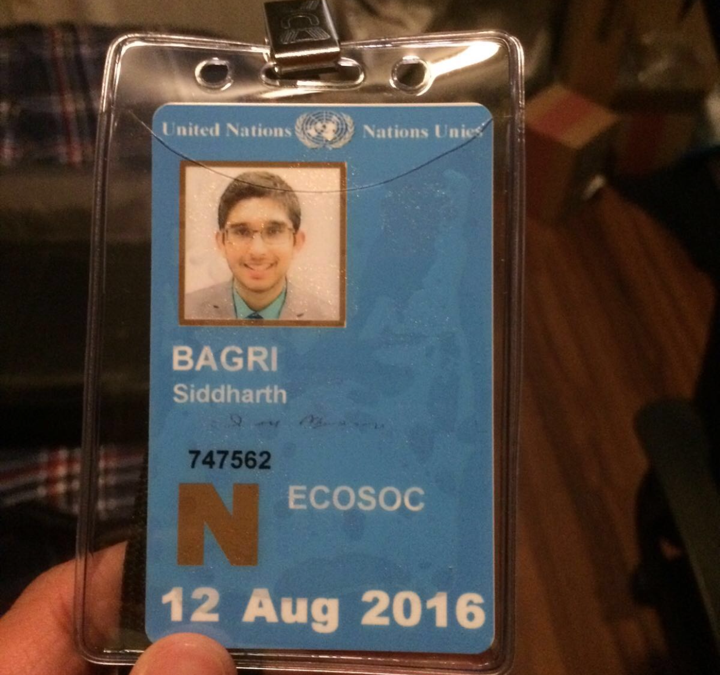
by Catherine Ruby | Aug 23, 2016 | Internship Experiences, Undergraduate Students
Working with Caritas Internationalis’ UN delegation with Mr. Joseph Donnelly gave me a close look inside the UN and on how NGO’s interact with the UN. Caritas is one of the world’s largest humanitarian organizations and much of my work involved researching and relaying information to my supervisor in order to help with his advocacy work. There was a focus on the current volatile situations in the 5 year old newest country, South Sudan, and the border regions of the country of Sudan itself. Sudanese forces have indiscriminately bombed civilians to the point where they have to retreat into caves in order to save themselves. Caritas is trying to provide aid to the people there but the government has also shown itself to be willing to bomb hospitals.
Caritas hosted the visit of a Sudanese Catholic bishop to advocate with UN agencies, Member States and NGOs about the sustained violence, intense human security and injustices taking place in South Kordofan, Nuba Mountains and Blue Nile regions. I scheduled meetings for the bishop. It was interesting to see how meetings are usually arranged in the UN system and I was surprised to learn how last minute some of them ended up being.
Organization is a key skill that I refined during this internship and I also sharpened my research skills. Towards the end of my internship I was asked to shift my focus to Latin America and the events going on there. I researched the current status of the historic peace process in Colombia between the government and the FARC after 50 years of fighting and a 2016 SC resolution/mechanism. This was an interesting experience, especially since I had to make sure that I filtered articles by date and made sure that my sources were reliable. This may sound like a straightforward and basic thing to do, but I realized that any mistakes that I made would have ramifications beyond me. This caused me to pay closer attention to small details.
I also learned to assess diplomatic language to a certain degree. I had the opportunity to attend meetings at the UN such as meetings in the ECOSOC chamber and the Security Council. Being able to hear how diplomats talk when they make speeches helped me navigate through the meanings beyond what was said. I am not exactly proficient at this, but it was a skill I previously did not have, and the more I refined it, the more interesting those meetings became.
My biggest takeaway from this internship would have to be a newfound appreciation for the UN and the various organizations that participate in the system. In the past, I was quite critical of the UN. I never thought that it should not exist, but I did think that the political dimension of it was a dead end that never seemed to work. The humanitarian work that the UN provided was the only thing it seemed to do better than anyone else, but since working at the UN I have come to realize that the UN is not a monolithic entity. Organizations like UNICEF are technically separate from the UN bureaucracy and so is the Security Council.
I realize now that the UN has taken the fall for many mistakes that originated from the member states, and that the UN is only as strong and as effective as the member states want to be. Politics certainly gets in the way of many of the initiatives that the UN tries to undertake, but the UN is still able to function despite the obstacles. I had never really considered the UN as a possible career path, but now that I have completed my internship there, I would not mind searching for a job there.
I would definitely recommend this internship to others. Perhaps they will walk away with a greater appreciation for the UN, as I did.
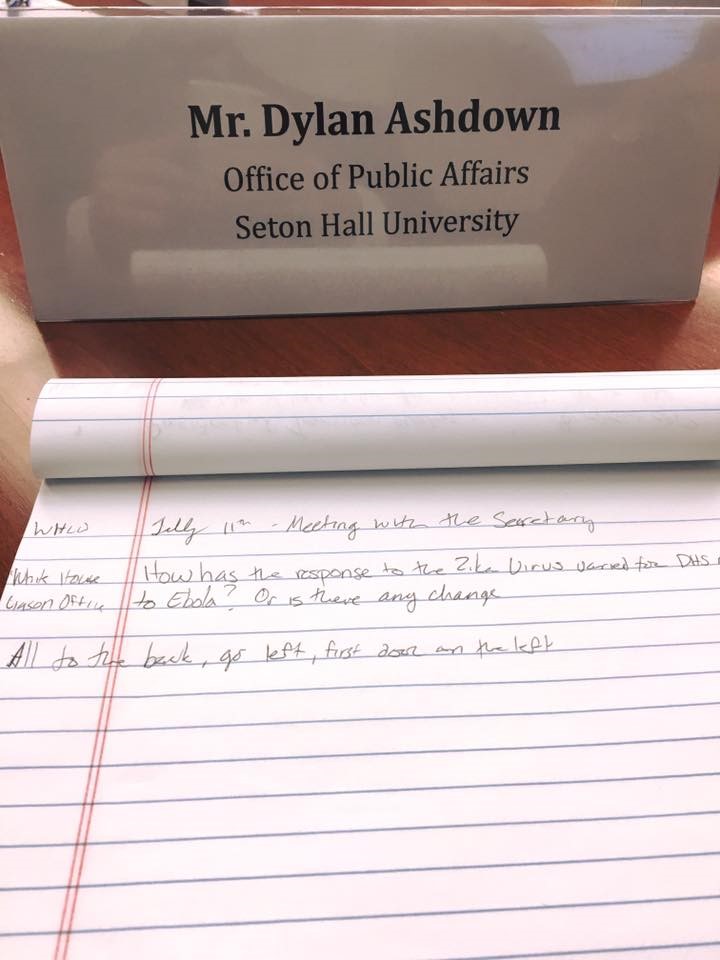
by Catherine Ruby | Aug 18, 2016 | Graduate Students, Internship Experiences
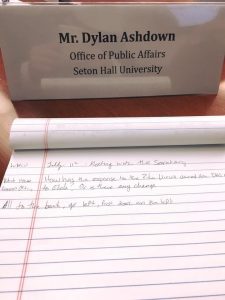
Finding a Home at Homeland Security
Hello, my name is Dylan Ashdown and I am currently a Public Affairs intern in the Office of Multimedia, Motion Pictures, and Television, Office of Public Affairs, Department of Homeland Security (DHS). At Seton Hall, I am finishing up two Master’s degrees which will be awarded to me at the end of my internship; one degree will be in Diplomacy and International Relations and the other is in Strategic Communication. This internship has been very beneficial and I highly recommend it to anyone who is interested!
I have the “cool” internship. I work directly with the writers and producers of documentaries, television shows, and feature films, along with other “non-news” media stakeholders. Both of my degrees have been of use in this internship. The other day a writer reached out to our office requesting DHS’s help with their show. I ended up spending a few hours researching where I would defect if I was a scientist escaping from an evil government in New York City for a script the writer was working on. This was something that was very relevant to my Diplomacy schooling. In terms of my Strategic Communication classes, I have put together pitch plans for movie producers and interviewed cybersecurity professionals, and technology experts/inventors (all of whom one can find in the Homeland Security).
There is always something exciting happening at DHS. For example, today I attended the daily morning briefing and found out that I was meeting the Secretary of Homeland Security in three hours. Three hour later, I am sitting in a room with 15 other interns getting a briefing directly from the Secretary. This is not your normal internship experience!
Ultimately, the best thing about my internship hasn’t been meeting politically famous people; the best part has been the mentorship that I have received from my supervisor. I never really understood the meaning of a mentor until I started this internship. I asked more questions in my month here at DHS than I ever did in my six years of school and my mentor has gone out of his way to answer all of them. I have learned how to walk, talk, and behave as a public affairs professional in Washington D.C. because of the hours that I have spent with my mentor and because of how much he trusts me to handle projects on my own.
The most rewarding part of my internship is knowing that my work has a direct impact on educating the American people on the work of the Department of Homeland Security. I am very happy that I chose to intern at the Department of Homeland Security, Office of Public Affairs.
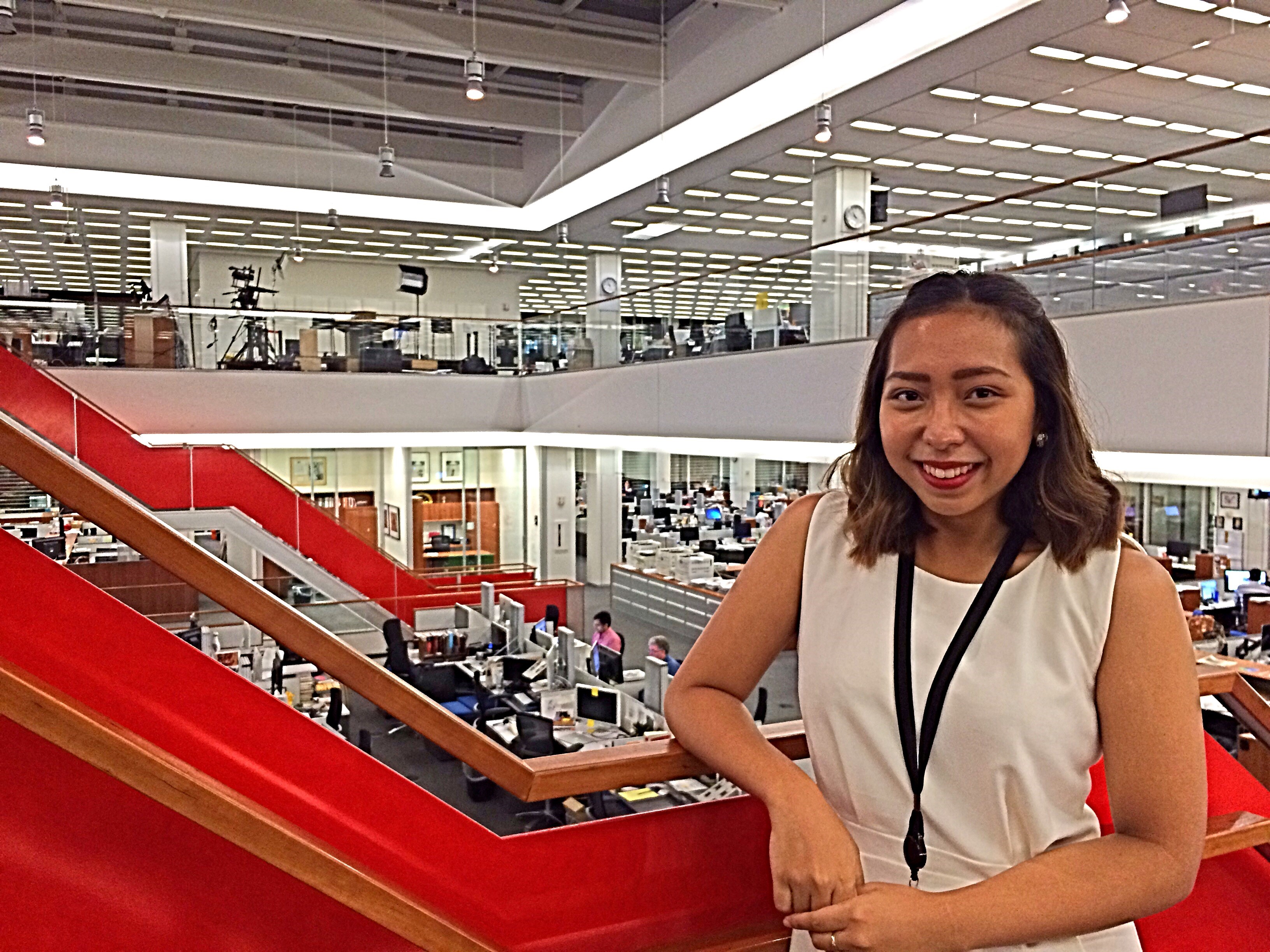
by Catherine Ruby | Aug 18, 2016 | Internship Experiences, Undergraduate Students
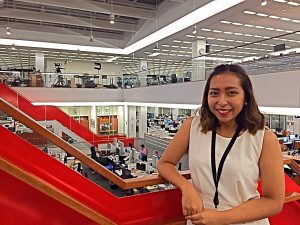
After Deadline – My Summer at The New York Times
I started my internship at The New York Times on the day of the Orlando attacks, the worst mass shooting in United States history.
Or maybe this thrilling summer began in May, when I spent a week at Temple University with 12 other lucky souls in what was, basically, editing boot camp – seven days that began with a wakeup call at 6 a.m. and ended after falling asleep on my books well past 1 a.m.
Let’s go even further and say the adventure started in December, two weeks before finals, when I got a phone call from a kindly old man who told me out of the blue that he would see me in Philadelphia. Confused, I asked, “Excuse me, what is this for?” And Professor Edward Trayes said, “Oh, The New York Times is looking to pay you $1000 a week to be an editing intern – does that sound good?”*
But this story really kicked off when I spent the entire month of October reviewing for the Dow Jones News Fund copy editing test – a tear-inducing, confidence-busting exam that around 1000 applicants subject themselves to every year, just for a shot at the world’s greatest bastion of journalism.
I thought I’d flunked the test, which made the call from Dr. Trayes all the more surprising. At that point, I would have been happy to be assigned to any desk at the Times, but Dr. Trayes thought I would be a good fit for the Foreign/National desk – or, paradise for an international relations major observing her first U.S. election.
Foreign/National was inundated by so much bad news this summer (multiple bombings, multiple shootings, multiple email scandals from the Democrats, multiple gaffes from Donald Trump) that one of the staff editors, a former Dow Jones intern, said, “Francesca, this is the no-joke desk. You should be proud of yourself for surviving this summer.”
Honestly, I’m just relieved I survived the hours: I worked on Saturdays from 9:30 a.m. to 4:30 p.m., then on Sundays to Wednesdays from 4 p.m. to 11 p.m.
A lot of things copy editors do are easier said than done – for example, writing a headline that is punchy and attention-grabbing and an accurate summary of the story while staying true to the lofty Timesian tone and fitting into the allotted layout perfectly is an art form.
The challenge for us interns was to make it on “After Deadline” – a weekly list on the Times’s internal blog that recognizes the past week’s best headlines. Only one out of nine ever made it (spoiler alert: it wasn’t me). Getting my first headline through to print had been hard enough, but it finally happened on a story about Hillary Clinton and Elizabeth Warren. My proudest achievement, though, was on the first night on the Democratic convention: I wrote the headline for a story about Michelle Obama’s relationship with Hillary Clinton, and for a few hours that night, it was the first hit on Google if you searched “Michelle Obama.”
There are many things that people don’t realize about newspapers. The locations you see at the top of the article? Those are called datelines, and they indicate that the reporter was actually on the ground. But that doesn’t mean real journalism is putting on a helmet and running around a war zone with a GoPro. Some budding news websites like to put reporters in the center of the story, producing content such as “Here’s What Happened When I Had Dinner with a Taliban Leader,” or something like that. The New York Times is the only legacy newspaper that still maintains an extensive international staff in bureaus throughout the world, and reporters are assigned to a region for extended periods, not just for one-day trips.
The highlight of my internship with the New York Times was when I met Azam Ahmed, the bureau chief formerly in Kabul and now in Mexico City. I was excited not only because he was a foreign correspondent, but also because he had written the article on Taliban justice that inspired my thesis. Talking to him made me want to be a foreign correspondent all the more. You could read every academic paper about Afghanistan, but an ivory tower academic will never be able to tell you about Afghanistan the way a journalist on the ground can.
Of course, it’s going to be a while before I’m anywhere close to being worthy of Azam’s credentials.
But this summer at The New York Times was an important stepping stone, and I am grateful to have experienced how a world-renowned newsroom with the highest standards works. Now it falls on me to build my street cred as a journalist and, hopefully, work my way back to the august institution on Eighth Avenue.
*I kid you not – this was how the conversation actually went.
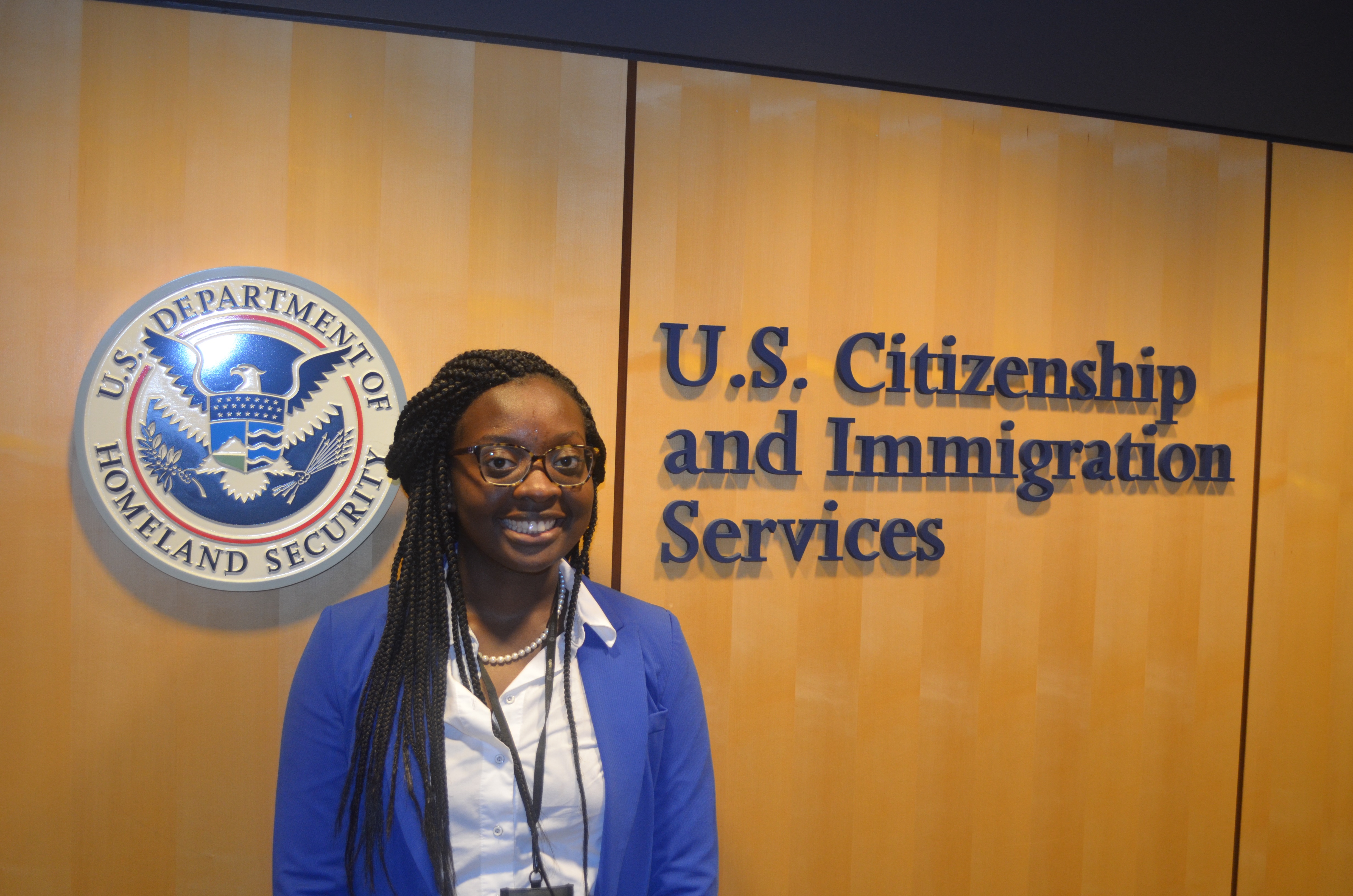
by Catherine Ruby | Aug 18, 2016 | Graduate Students, Internship Experiences
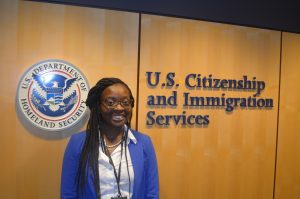
I am Nina Robinson, a dual degree candidate of the M.A. programs in Diplomacy and Asian Studies. I interned with the Department of Homeland Security: United States Citizenship and Immigration Services (USCIS), specifically with the Office of Privacy. My long-term goal is to become a Foreign Service Officer and to one day serve as a Career Ambassador. Since high school, after studying in China for two consecutive summers, I knew that I wanted to dedicate my life to a career in Diplomacy.
Essentially, my desire to hone my skills and apply the knowledge that I learned in my Diplomacy classes; gain Federal Government experience; and to prepare for a career serving the United States, is what led me to pursue an internship with DHS-USCIS. The Department of Homeland Security was created after the September 11, 2001 terrorist attacks, to safeguard the United States’ border. The agency’s mission is to protect all people, including U.S. citizens, permanent legal residents, immigrants, and non-U.S. citizens. The Department of Homeland Security has offices almost all over the world, which assists those who wish to become citizens and seek asylum due to fear of persecution or danger.
Working with the Department of Homeland Security- United States Citizenship and Immigration Services, introduced me to the many avenues that one may take to establish a federal career focused on international relations. The Office of Privacy, although a small office and often confused with civil liberties or security, plays an important role in the agency. USCIS works to ensure that citizens around the world have the opportunity to become U.S. citizens and provides benefits and services for immigrants. The Office of Privacy works to ensure that the work conducted in USCIS promotes transparency in the government and protects its clients who include non-U.S. citizens and immigrants. The Privacy Act of 1974, which was enacted after the Watergate scandal with then-President Richard Nixon, is the cornerstone of my office. This Act is what helps the Office of Privacy guarantee that information being collected from the people by the government is being protected. Our office ensures that immigrants’ and citizens’ personal information, provided to the Department of Homeland Security and the United States Citizenship and Immigration Services, is being protected, which includes informing clients of what their information is being used for and how it will be used.
In the short period of time I interned here, I have learned a tremendous amount. I have attended four trainings, all which are exclusive to the analysts and officers in the Office of Privacy. As not to go too far into specifics, I have learned about the importance of encrypting PII (Personal Identifiable Information) and various information sharing database sources that the United States and other partner countries use to identify suspected terrorists. Along with training, my office has also provided mentorship, helping me to familiarize myself with various Privacy Act Laws as it relates to the Federal Government and offering career related advice. My life-long dream of becoming an ambassador has not changed. However, Privacy has become a big issue in the world of International Affairs and is a growing field. Students who are looking to put their diplomacy and analytical skills to use may find Privacy an interesting and exciting alternative to the Diplomacy field.
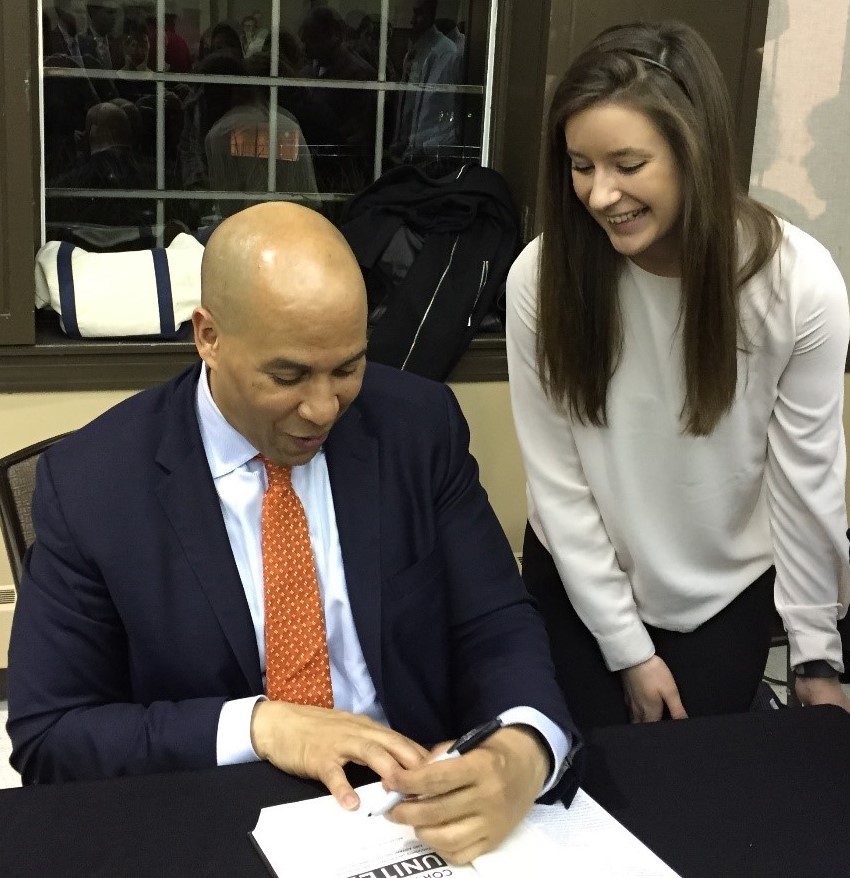
by Carolin Braxenthaler | May 5, 2016 | Internship Experiences, Undergraduate Students
Most people would describe the city of Newark as a struggling neighborhood of crime and poverty. However, my experience working for the Office of Senator Cory Booker has opened my eyes to see Newark and many other cities as thriving hubs of opportunity and development.
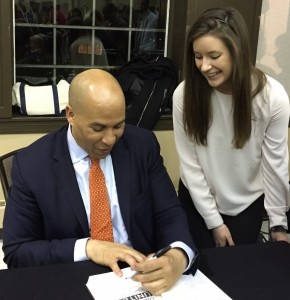
Diplomacy student Clare Duda with Senator Cory Booker
Senator Booker splits his time between Washington D.C. and New Jersey for congressional duties, travels in support of the 2016 presidential elections, and is currently on a book tour for his new bestseller “United”. As the Senator reports to his busy schedule, his office staff is the engine that keeps the congressional machine running. The Senator’s office in Newark is full of youthfully charged energy ready to take on any constituent inquiry, state development, and congressional opportunity released to the Senator. As an intern for a federal office, the day begins with a review of daily newspapers to keep each of the three senate offices, located in Washington D.C., Camden, and Newark, up to date with current events and happenings involving the state of New Jersey and Senator Booker himself. As time in the office of the Senator has passed I have had the opportunity to work with constituent advocates, case workers, and special project teams to work on policy memos, research speech materials, and respond to constituent requests.
Constituents usually write to the Senator when they are in need of help and have nowhere else to turn. I have had the opportunity to work on cases regarding immigration, environmental concerns, military affairs, health, and education. Along with deciphering if a new case can be developed by a federal office, I have interacted with constituents one on one, gaging cases and assigning each one to the proper caseworker to take care of their issue. The Senator’s office is dedicated to assisting constituents with concerns. I have become a part of a team which has reached out on behalf of immigration visas, retrieved documents from the VA, and worked with Medicaid providers to deliver health care resources to constituents who could not afford them. As time has passed in the Newark office I have witnessed the level of dedication each staff member has to their job and the citizens of New Jersey. The senatorial staff has exemplified dedication, professionalism, and compassion within the workplace and I would encourage anyone to write to the office of Senator Booker if they were ever to have a congressional inquiry.
As an international relations and diplomacy major I focus my interest in the national security and intelligence sectors of the federal government. I use talents developed through the School of International Relations and Diplomacy to brief policy documents, critically analyze cases, and develop writing samples for community outreach. Working for Senator Booker has provided me with the foresight of how a federal office operates and has furthered my interest in a future of public service. From my internship I gained skills of time management, adoption of new ideas, and adaptation to new opportunities. Offering support to the congressional staff and the constituents of New Jersey has been both rewarding and fulfilling. Similar to the city of Newark, I realized the potential I hold in creating change, whether big or small; every action I take is growth. Working for the Office of the Senator has given me construction materials to expand my own personal development.
by Carolin Braxenthaler | May 5, 2016 | Graduate Students, Internship Experiences
My name is John “Jack” Rotticci and I am in my second semester studying a Master of Arts in Diplomacy and International Relations. I majored in international business during my undergraduate studies and was excited to continue learning about international trade as part of my specializations at Seton Hall’s School of Diplomacy, which are International Economics and Development, and Global Negotiation and Conflict Management. This semester, I am taking an internship course that provides both a look at the combination of knowledge and skills required to perform in the field of international trade, and more specifically, an up-close opportunity to explore the daily operations of a career in commercial advocacy.
My placement is with the U.S. Commercial Service Export Assistance Center, Northern New Jersey, commonly referred to as a USEAC, where a small staff of International Trade Specialists is responsible for assisting in and promoting exports by northern New Jersey manufacturers and service providers. Each International Trade Specialist is responsible for working with a certain group of industries. My role as an intern, or as we have taken to calling it in the office, an “international trade assistant,” is to support the trade specialists in their pursuit of this goal. This is a neat feature of the internship because it allows me to get an introduction and a feel for each industry. This is valuable knowledge as I have already found some industries that I am particularly interested in – and some that I am particularly uninterested in.
Another great feature of my internship at the NNJ USEAC is the group of professionals I work with. The small team environment means that, unlike many internships, I do not spend the day in the basement stapling reports or running for coffee. It can be a challenge because the team truly relies on every member, including me, the intern; however, the office environment makes me feel comfortable asking questions if I am unsure. Furthermore, I am given more responsibilties after I prove that I can handle them.
You will be asked to take on several projects and initiatives at this internship, each with different levels of priority and timelines. It is up to the intern to prioritize time to accomplish what is asked. I have thoroughly appreciated this autonomy as it has provided opportunities to prove my ability to both the team and to myself, to make mistakes and learn from them, to learn in the process of researching and completing a project.
One such type of project is event planning. As an intern at the NNJ USEAC, I helped to organize several informative trade promotion events. I was recently able to help on an Introduction to Exporting to Canada event. While this event was not directly a USEAC event, I worked with partner offices to ensure that the attendees had access to information about all of the assistance services available to them in their efforts to export.
I am also helping to organize an event held in cooperation with the Bureau of Industry and Security (BIS) that focuses on compliance with US export controls. As part of the planning process, I researched export controls and got a better grip on what the federal government is doing to ensure that rogue states cannot profit from illegal or sanctioned international trade.
I find this internship to be much more rewarding than others I have previously completed. This is largely due to the fact that I am treated as a team member as opposed to a temporary intern. The team is committed to ensuring that I am not only given the opportunity to contribute all that my ability will allow, but also, that the internship is actually serving as a learning experience and helping me to better understand the Commercial Service as a potential career path. I would enthusiastically encourage any student interested in international trade and commercial diplomacy to apply.
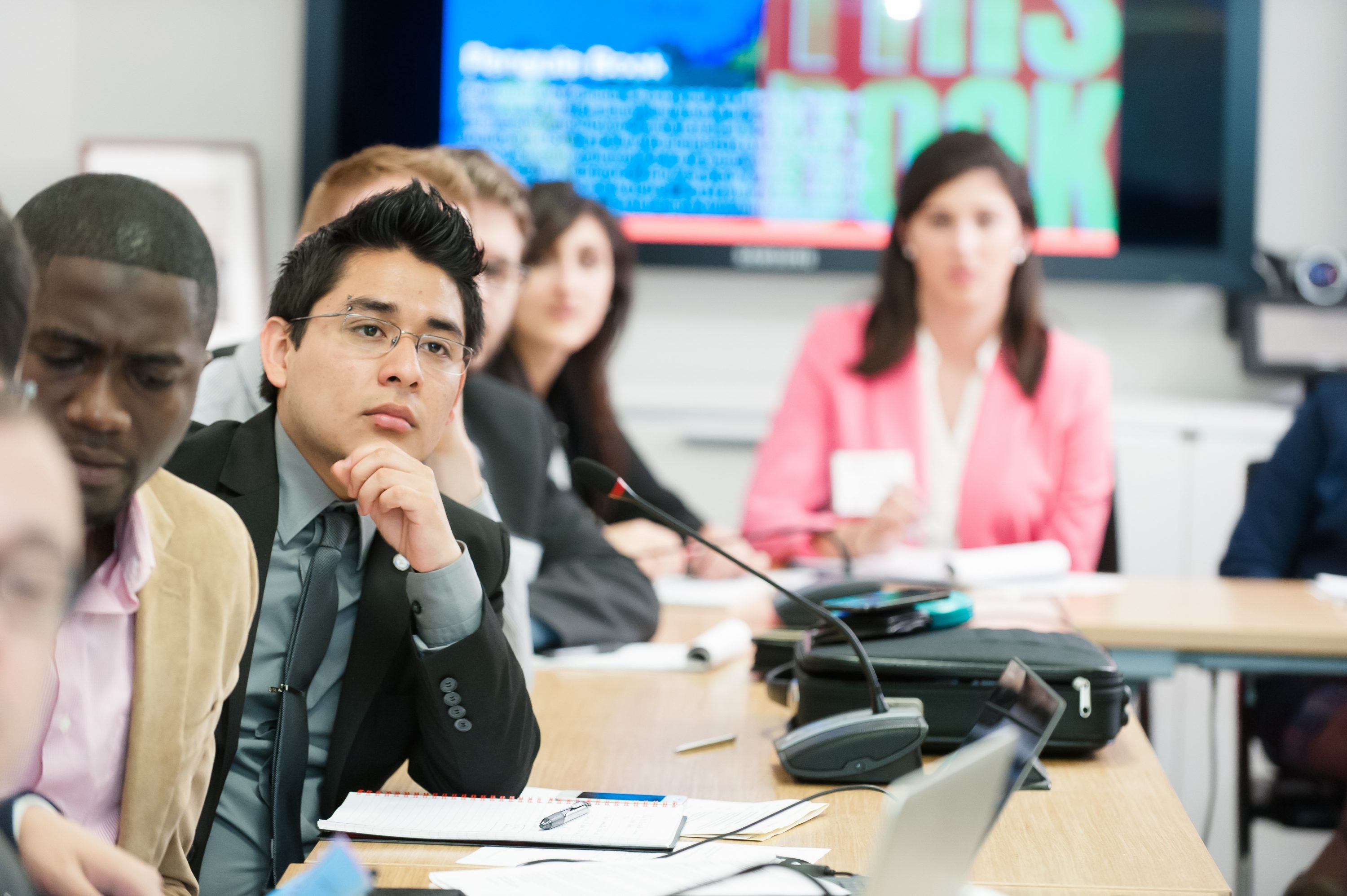
by Catherine Ruby | May 5, 2016 | Internship Experiences, Undergraduate Students
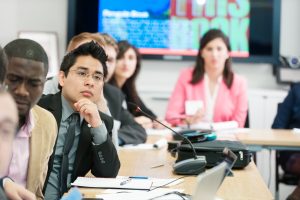
My name is Jose, I am a junior at the School of Diplomacy with a deep interest in the Latin American region. I intern at The Network for Religious and Traditional Peacemakers (the Network). This organization is led by Antti Pentikainen and funded by the Government of Finland. Its purpose is to work with small communities, and religious and international leaders to promote peace around the globe. I would like to give you an insight of my ongoing journey as an intern and share with you my experiences during the spring 2016 semester.
As an intern, my priority is to keep abreast of the initiatives that the Network has implemented, and collect information used for the Network’s newsletter. Additionally, I am occasionally assigned to cover conferences related to the objectives and core values of the network. Since the Network is an NGO registered with ECOSOC at the United Nations, I have a grounds pass that allows me to have access to open meetings. During the first two weeks of the internship, I attended conferences at the International Peace Institute and at the UN Headquarters. At first, I took notes and briefed Mr. Pentikainen. Then, as I met more members of the Network, I began to learn from them and became comfortable with expressing my ideas. As a result, I volunteered to attend conferences of pertinent topics and submit my own articles for approval by the Network’s secretariat. This was an important step because an intern is widely stereotyped as someone whose responsibility is making copies or getting coffee, someone who is consistently told what to do. Be that as it may, in order to stand out, it is our responsibility to convert from knowledge-consumers to knowledge-producers.
During my hiring interview, Antti Pentikainen, the Network’s Executive director, asked what my dream job or goal was. I said that I would like to be part of the mediation process at the UN, but acknowledged the challenges of dealing with the elites at the global level. For that reason, I would rather focus on a region where my contribution may have a sustainable impact for peace and conflict resolution and not be seen as a quick fix. “If you want to work at the UN, you have to make yourself relevant” said Antti as he offered to facilitate a conversation with experts that could point me in the right direction. On February 15th, the Network’s core members gathered in the NY headquarters to talk about what the current Network’s status was and the direction it was expected to go in. Martine, a member and expert on South Asia, asked me if I thought I was being utilized constructively as an intern. I had been interning for just two weeks, so I did not know how to respond to that. “When I was an intern I brought my boss a proposal of three things I wanted to work with. I recommend you do the same in the area you’re interested in, especially Latin America where the Network’s presence isn’t as strong,” said Martine after my long pause. Although with a different angle, Martine’s advice reiterated what Antti said to me the first day I met him: “make yourself relevant”.
That same day, I talked to Antti and asked for two things: The first is that I wanted to be more involved in the Network’s affairs in Latin America; the second was that I wanted to write short articles about the conferences I attended as long as they were related to the organization’s core values, and hence could potentially be incorporated into the newsletter. I was expecting a long diplomatic, eloquent answer that politely declined my ideas. Instead, I got an “okay” followed by a smile and was Cc’d on an email in which I was recommended to provide assistance to a Network affiliate with a strong presence in Latin America where.
Currently, I am helping with the coordination and logistics for conferences and projects dealing with stability in the Americas and have access to information that isn’t always readily available in mainstream media or simply disregarded because of other issues that dominate the headlines. As for attending conferences and writing my own articles, I will be traveling to Washington DC to cover the gathering of leaders from several religions in the Americas. I am also working with Religions for Peace staff in the preparations of a panel where I will be the moderator.
It has been difficult to balance it with schoolwork, but I enjoy every day I spend at my internship. I was extremely lucky to have met a staff that treats me as if they had known me for years and a humble boss who treats others like family and who is always there to help me. Being an intern at the Network requires a lot of work, time and dedication, but the experience they offer is immeasurable.
For anyone who wants to intern in New York, particularly during the spring semester, I have two recommendations that will help you grow and, perhaps, survive:
First, do not be afraid to offer assistance, ask questions, or be the first one to raise your hand if there is an upcoming project that may be of interest to you, provided you’re able to deliver good results.
Second, after snowstorms, bring your dress shoes and an extra pair of socks in a bag, you may need them.
I hope you enjoyed reading about my journey thus far at the Network as much as I have enjoyed working for them. If there is anyone interested in becoming a part of this team, or if there are any questions, I am more than happy to answer them; working here has given me far more joy than I ever imagined and I’m sure you’d feel the same way.
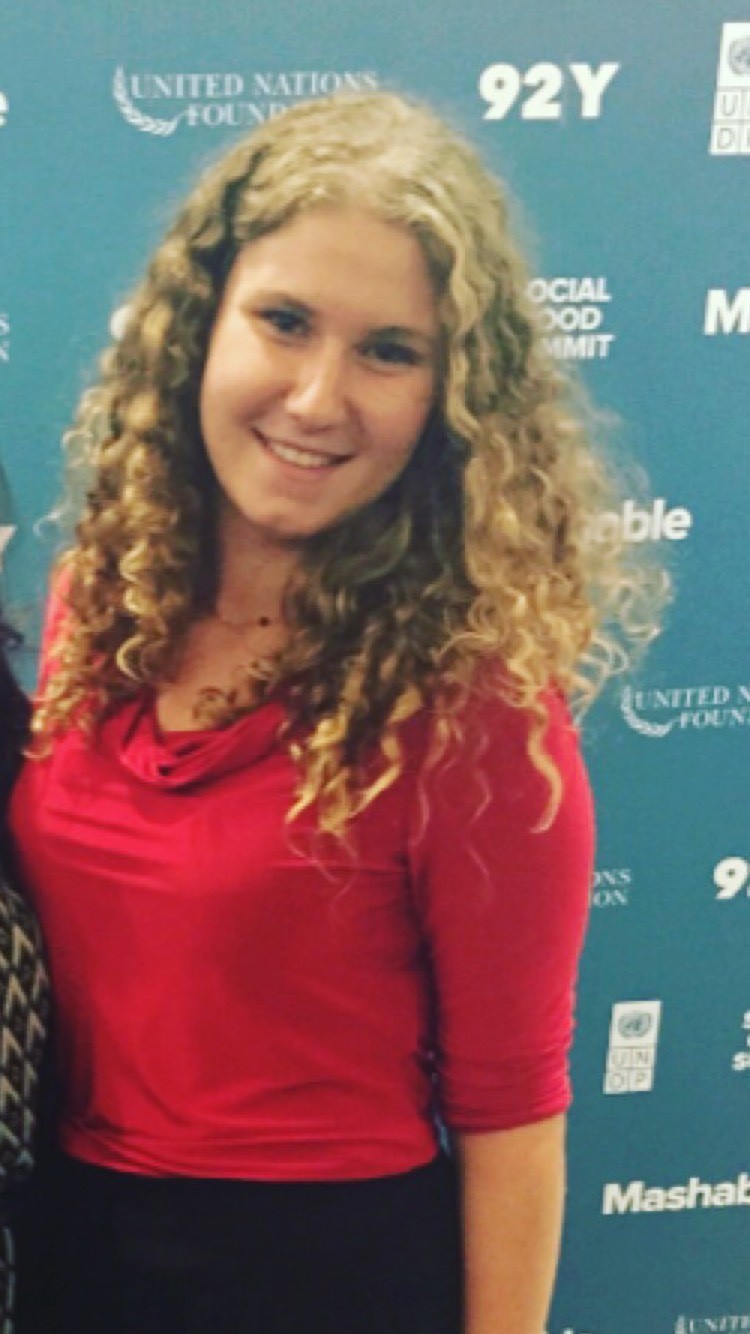
by Carolin Braxenthaler | May 5, 2016 | Internship Experiences, Undergraduate Students
My name is Elaina Estrin, I am a junior at the School of Diplomacy and International Relations, with minors in Economics and Modern Languages. I am interning with the United Nations Foundation (UNF) as a United Nations Relations and Policy intern. UNF is a nonprofit organization that combines the work of the UN with the work of others around the world to help tackle global issues.
One of my main responsibilities is to compile the daily update that is sent out to UNF staff and partners. The daily update includes any new information put out by the UN, including new appointments, reports released by various UN missions, updates from UN organizations, all briefings conducted at the UN, as well as any up to the minute news from countries in conflict around the world. This newsletter is a great source of news for anyone working in or with the UN. Other responsibilities at the UNF also include attending events at the UN that align with the goals of UNF, compiling briefings, and updating the staff about these events. I have been able to follow announcements on the Syria negotiations, post Paris Agreement talks, highlights of Davos (the World Economic Form), humanitarian financing, events predating the World Humanitarian Summit, and the Secretary General’s Plan of Action to prevent violent extremism just to name a few.
My classes at the School of Diplomacy have guided and prepared me for this internship opportunity. From classes like International Relations, which laid the groundwork for my knowledge in the field and introduced me to some of the issue areas that I am most passionate about today; to Institutions of Global Governance, which introduced me to the different actors in the international system, global problems, and global policymaking. The School of Diplomacy also introduced me to Public International Law and how different agreements at the UN translate legally, as well as what constitutes a human rights violation or a war crime. This understanding of the international community and international law is vital to work in the fast-paced environment of the UNF.
When UNF was first launched in 1998, its main purpose was to support UN causes. Over the years, UNF’s role has transformed from encouraging support for the UN to creating huge global campaigns in partnership with the UN on some of the biggest issues that humanity is facing in the 21st century. A lot of the work I do is in support of the new Sustainable Development Goals (SDGs), which are the world framework for the next 15 years. Some of the other issues UNF focuses on are child health, climate change, energy, technology, women and girls, and population.
I not only learned about the inner workings of a nonprofit organization, but also about the UN and its noble causes. Interning with UNF greatly improved my writing and critical thinking skills, which will be valuable in any profession. The knowledge I gained from researching different international issues for UNF has been the biggest takeaway; it has increased my passion and drive to create change for women and girls an in education.
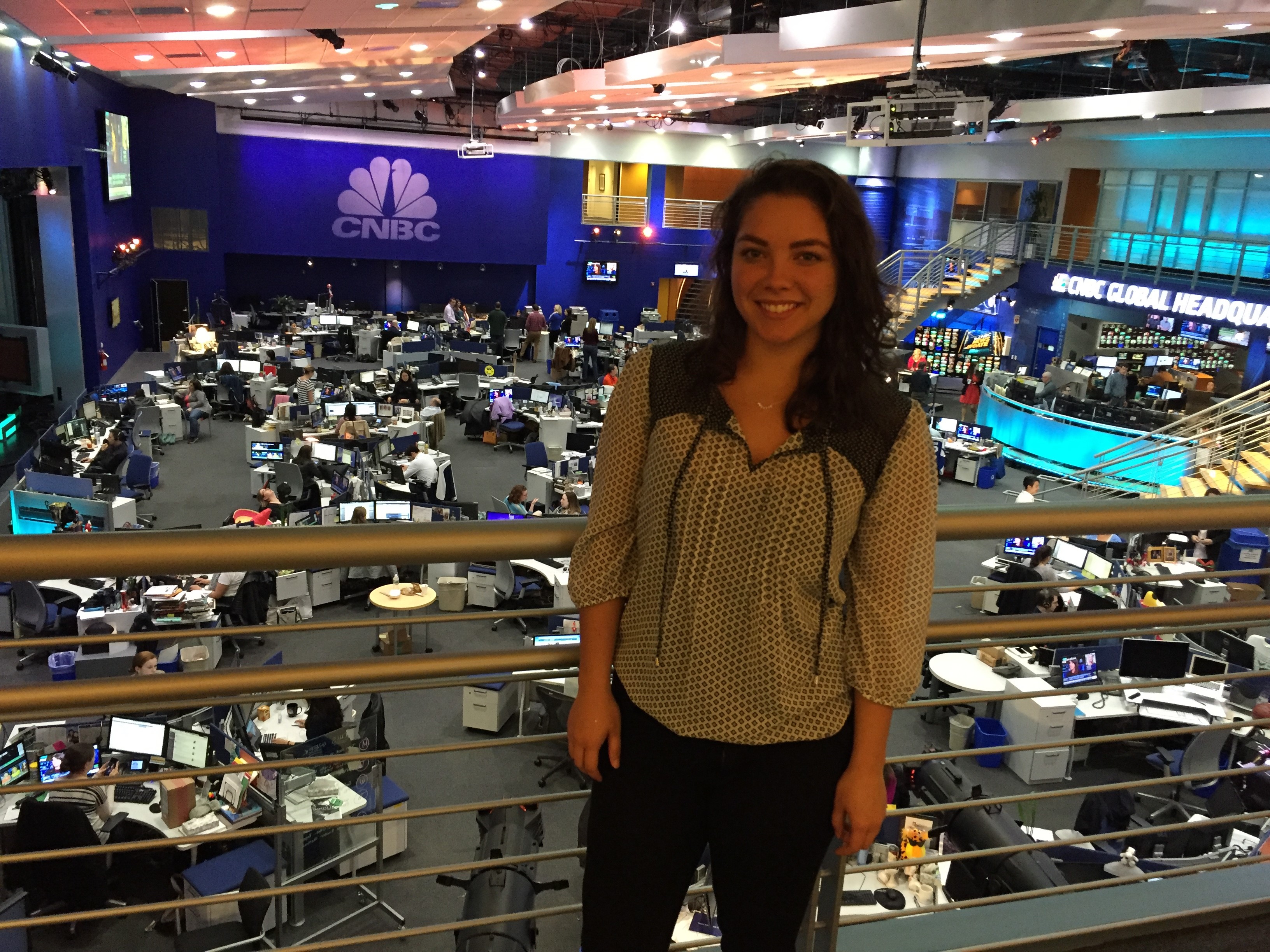
by Carolin Braxenthaler | May 5, 2016 | Internship Experiences, Undergraduate Students

My name is Emily Balan, I will graduate in May 2016 with a degree in international relations and diplomacy, a degree in philosophy, and with minors in French and journalism. After exploring the non-profit sector last year for my first internship (I was the communications intern at the human rights advocacy NGO Human Rights First), I decided I wanted to explore the realm of the newsroom. In my last semester, I am a digital breaking news desk intern at CNBC, the financial news network.
At CNBC in Englewood Cliffs, N.J., I am treated as a news associate, which is like an entry-level job for a journalist. I attend the morning and afternoon briefings where all the departments and section editors brief the managing editor on what they’re working on for the day and other long term projects. I am mainly responsible for producing content for the website. This means grabbing wire stories that are relevant to our readers’ interests. It also means doing some reporting and writing up small stories to publish on the website.
I work closely with the digital team, helping with formatting, as well as with research for projects. I am working with my on-site internship supervisor and another editor, who handles most of the international stories, in order to produce my own story. I had visited the Czech Republic immediately before starting my internship, so I collaborated with these editors to pitch a story that I have been researching in my spare time at CNBC.
I have been able to develop close working relationships with my fellow interns as well as news associates since we are all working in an open air space. The news room, without the myriad blocks of desks and cool lighting with a studio built in, could look like a large warehouse in terms of open space and lack of architectural design. The open air, however, makes it more conducive for editors to communicate quickly and directly when breaking news comes in.
The newsroom can definitely be an exciting, albeit intimidating, place. On my second day, the Fed made a major decision and I jumped right in to feed quotes from an on-air guest to the editor writing up the story for the website. On most days, I merely bear witness to the excitement since intern-liability is too great for a network whose majority viewership is in the financial sector. I find that I am learning how to keep up with such a fast-paced environment, as well as instilling the journalistic values of accuracy and timeliness.
I am learning more than I ever thought I would know about the financial world, both in the United States and around the world. I am thankful that I saved the two classes – International Political Economy and Economic Aspects of the International System – for my last semester because they were a great starting point that gave me a framework to think about the global financial news. Right now, the big story is on oil: it is the main export of many fiscally powerful countries (think OPEC) and the low prices impact international relations. There have been several meetings of world powers to coordinate efforts to stabilize the global economy in light of a strengthening dollar combined with low oil prices.
The most challenging aspect of the job, however, is precisely that I do not know the business behind these stories. I am not familiar with how the stock market works, although I study for pop quizzes on current topics from the managing editor during our twice-daily briefings. It is also challenging to be in such a tense environment where anything could happen at any time. I find myself intimidated by these busy and important people, whose work affects so many others. I found that I have to purposefully instill myself with the confidence necessary to talk about my projects and pitch stories on a weekly basis.
There is some respite in the chaos of the newsroom. Since I am more available than some of the other interns, I work for the commentary section, mainly copy editing articles and contemplating them (adding links and writing headlines and descriptions) to be published at the peak of their news timeliness. This is a more laid back environment, separated from the constant stream of news from before the market opens to after the closing bell.
I would definitely recommend this internship. My supervisors and everyone involved in the internship process have been more than welcoming and accommodating. I would say, however, to make sure that you have a thick skin and that you have an interest in the financial aspect of things, even if it is just to learn more about the subject. It is tough to report on a subject you know very little about, but the learning experience and the newsroom environment is more than enough to make up for the intimidating pressure.

















